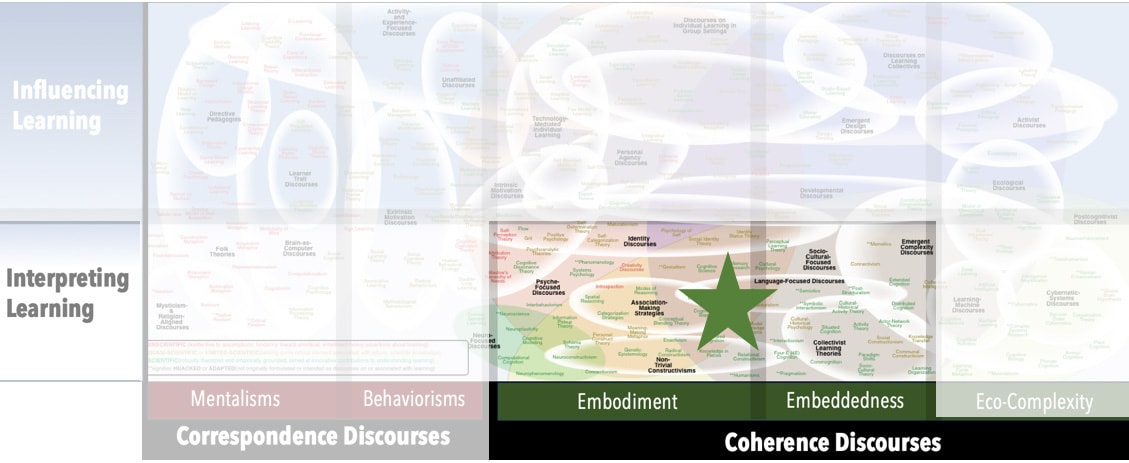Focus
Role of language in enabling the co-creation of individual and cultural beingsPrincipal Metaphors
- Knowledge is … scope of possible symbol-mediated interpretation
- Knowing is … co-created reality
- Learner is … a co-creator (individual in social or cultural context)
- Learning is … participating (in creating and recreating reality)
- Teaching is … N/A
Originated
1960sSynopsis
Symbolic Interactionism aims to offer insight into how culture is preserved through interactions among individuals. It posits that formal symbolic systems – and, in particular, language – are the sources and media of all meaning. Symbolic Interactionism is focused on how individuals interact to create and recreate symbolic worlds and, in turn, how those co-created symbolic worlds shape each individual’s actions and interpretations. Importantly, Symbolic Interactionism’s focus on co-created worlds is not a denial of a physical reality; however, the theory does entail that one’s experience of reality is conditioned by interpretations encoded in shared language. Associated discourses include:-
Discursivism (Discourse Ethics; Communicative Action) (Jürgen Habermas, 1970s) – a perspective on the role of language in the development of society and in the justification of norms and laws, suggesting that these arise through communicative action. Subdiscourses include:
- Radical Discursivism (Jacques Derrida, 1990s) – a version of Discursivism that incorporates Post-Structuralism and Critical Theory (under Critical Pedagogy)
-
Generalized Other – in Symbolic Interactionism, one’s internalized sense of societal norms, values, and expectations that shape an individual's self-concept and behavior. The Generalized Other guides how people interpret social interactions and understand their roles within society.
- Normative Cognition (Jeppe Sinding Jensen, 2010s) – a reference to the capacities to develop and promulgate behavioral norms, shared beliefs, and social values. Normative Cognition is generally argued to be dependent on capacities to use and manipulate symbols.
Commentary
Some critics have argued that Symbolic Interactionism is not one theory, but a framework comprising many theories. A closely related criticism is that Symbolic Interactionism is too broad, general, and unsystematic to be of much use.Authors and/or Prominent Influences
George Herbert Mead; Charles Horton Cooley; Herbert BlumerStatus as a Theory of Learning
Symbolic Interactionism is a theory of learning on both individual and collective levels, including an emphasis on their mutually specifying dynamics.Status as a Theory of Teaching
Symbolic Interactionism is not a scientific theory of teaching.Status as a Scientific Theory
Symbolic Interactionism is frequently criticized by researchers with empiricist leanings as too reliant on qualitative research methods and/or being untestable. In our analysis, given the clarity of around its foci and constructs and its substantial evidence base, Symbolic Interactionism meets our criteria of a scientific theory.Subdiscourses:
- Discursivism (Discourse Ethics; Communicative Action)
- Generalized Other
- Normative Cognition
- Radical Discursivism
Map Location

Please cite this article as:
Davis, B., & Francis, K. (2025). “Symbolic Interactionism” in Discourses on Learning in Education. https://learningdiscourses.com.
⇦ Back to Map
⇦ Back to List
